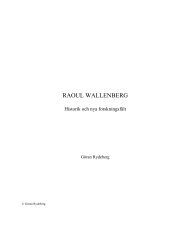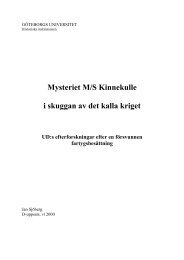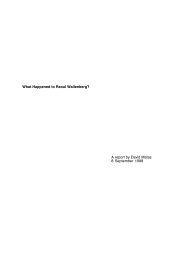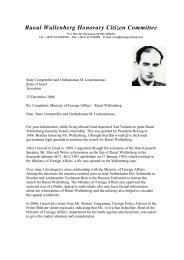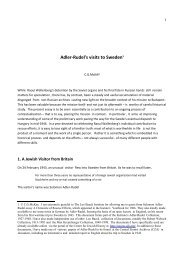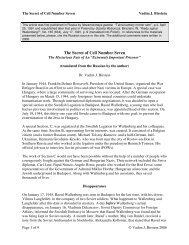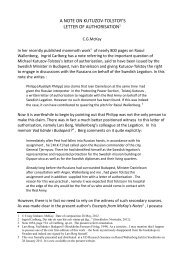raoul wallenberg swedish humint actions during ww2 - Searching for ...
raoul wallenberg swedish humint actions during ww2 - Searching for ...
raoul wallenberg swedish humint actions during ww2 - Searching for ...
Create successful ePaper yourself
Turn your PDF publications into a flip-book with our unique Google optimized e-Paper software.
On 21 February 1990 Director of Intelligence William Henhoeffer issued a report entitled<br />
“Raoul Wallenberg and his US Intelligence Connections” in which he fully confirms the<br />
statements of Iver Olsen, claiming that Wallenberg had nothing to do with the OSS and that<br />
the Swedish diplomat worked solely <strong>for</strong> the WRB. Nor were the OSS and other intelligence<br />
organisations involved in any financing of his mission.<br />
There has also been speculation about the nature of the US interest in the fate of Wallenberg.<br />
Why did Washington try to intervene? Of course it can be said that because Wallenberg<br />
worked <strong>for</strong> and was financed by a US organisation, it was quite natural that the US<br />
government would pay attention to his fate, especially when it became obvious that the<br />
official Swedish authorities were being unsuccessful in their ef<strong>for</strong>ts to find out what had<br />
really happened. The Soviet/Russian historian Lev Bezymenskij, who has been investigating<br />
the case <strong>for</strong> many years, has quoted anonymous sources in his home country which have<br />
claimed that the US ef<strong>for</strong>ts convinced the Swedish authorities that “Wallenberg was a spy”.<br />
/Bezymenskij 2001 p. 69./ According to the author, Sweden and the US have never dared to put<br />
every aspect of the case <strong>for</strong>ward to Moscow because Wallenberg was an American spy and<br />
the affair is consequently an embarrassment to both countries.<br />
If the US trail nevertheless is somewhat cold, what about the British connections? In London<br />
there was close cooperation between Swedish representatives and the Norwegian government<br />
in exile and it is now obvious that the OSS chaperoned these activities of the two<br />
neighbouring countries. /Finstrom 2002 p. 67./<br />
Inside Sweden there were contacts between the authorities and the British intelligence<br />
organisation SOE (Special Operations Executive), which from bases in Northern Sweden tried<br />
to support the Norwegian resistance movement. It was well known that the influential<br />
businessmen Jacob and Marcus Wallenberg Junior (cousins of Raoul’s late father) had close<br />
contacts with British authorities. Whether they or any other actors introduced their young<br />
relative to their British connections we do not know.<br />
However, there are some oddities concerning Raoul Wallenberg’s relations with Great Britain<br />
<strong>during</strong> his mission in Budapest and even stranger is his close cooperation with the British<br />
press attaché in Stockholm, the leftist Hungarian <strong>for</strong>mer government member in exile, Vilmos<br />
Böhm. From the very beginning Böhm was one of those who knew the most about the<br />
mission. That was not especially strange, since he was an influential person in the exiled<br />
Hungarian community. He had been a member of Béla Kun’s short-lived revolutionary<br />
government in Hungary in the early 1920s and had been living in various countries and finally<br />
Sweden from the middle of the 1930s. Wallenberg used Böhm as a source of in<strong>for</strong>mation<br />
<strong>during</strong> his stay in Budapest and the Hungarian himself helped the diplomat get in touch with<br />
various influential and anti-fascist people in Budapest. In so doing, Wallenberg of course<br />
obtained a great deal of in<strong>for</strong>mation but on the other hand he was obviously exposed to<br />
dangers. If it had wanted to do so, the Hungarian government could easily have put an end to<br />
his mission if they suspected the young diplomat of being connected with the resistance<br />
movement.<br />
We also know that Wallenberg’s reports from the field to Böhm were <strong>for</strong>warded to the British<br />
authorities, which were very well in<strong>for</strong>med about the <strong>actions</strong> of the Swede and his staff.<br />
Böhm himself also poses a great enigma in another respect. Though we do not have any proof<br />
of him also being an in<strong>for</strong>mer <strong>for</strong> the Soviet Union, his <strong>actions</strong> after the arrest of Wallenberg<br />
strongly indicate that this was the case. /See the article in the Swedish newspaper Dagens Nyheter (DN) by Wilhelm<br />
Agrell on 12 May 2003, “Raoul Wallenbergs vän förrådde honom" (The friend who betrayed Raoul Wallenberg). Agrell asserted that there<br />
are strong indications that Böhm was a Soviet spy. Others have since claimed that Agrell has misinterpreted the sources./ It was<br />
Böhm who was the first to in<strong>for</strong>m the Swedish authorities (on 9 March 1945) that Wallenberg<br />
had disappeared without trace. The Soviet authorities had claimed as early as on 16 January<br />
the same year that the Swedish diplomat had been taken care of in Budapest and it is<br />
absolutely certain that Böhm acted systematically to support the statements and explanations<br />
6




